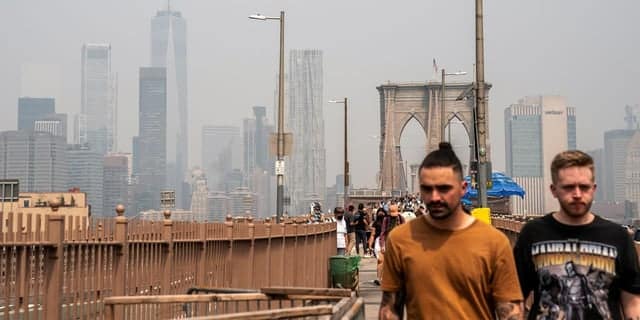New York City Begins Tough Crackdown on Airbnb Listings
New York City is taking strict measures to crack down on Airbnb listings, targeting illegal rentals and imposing hefty fines. In response to concerns about the impact of short-term rentals on affordable housing and the hotel industry, the city is ramping up enforcement and requiring platforms like Airbnb to share data on their hosts.
Violators could face fines of up to $7,500 for each illegal listing. This aggressive move aims to regulate the short-term rental market and ensure compliance with existing laws, protecting the availability and affordability of housing for New Yorkers. Introducing new regulations to combat the proliferation of short-term rentals in the city, New York City has launched a comprehensive crackdown on Airbnb listings.
With concerns about the effects of these rentals on the city’s housing affordability and the traditional hotel industry, the city is now implementing stricter enforcement measures. In an attempt to monitor and control the short-term rental market effectively, platforms such as Airbnb will be required to share host data, while violators could face substantial penalties up to $7,500 per illegal listing. The primary objective behind this rigorous initiative is to safeguard the availability and affordability of housing for the residents of New York City.
Introduction To Airbnb In New York City
New York City has recently taken decisive action to crack down on Airbnb listings, resulting in a tough regulatory approach. This move marks a significant shift in the city’s efforts to address the issue of short-term rentals within its limits.
New York City is a vibrant and bustling city that never sleeps, attracting millions of tourists and visitors each year. With its iconic landmarks, diverse neighborhoods, and vibrant cultural scene, it’s no wonder that people from around the world flock to the city.
As the popularity of New York City as a tourist destination continues to grow, so does the demand for alternative accommodation options. One such option that has gained significant traction in recent years is Airbnb.
Growing Popularity Of Airbnb In Nyc:
- Affordable and flexible accommodation: Airbnb provides a more affordable and flexible accommodation option for visitors compared to traditional hotels, especially in a city known for its pricey hotel rates. It allows travelers to find unique and often more affordable places to stay, such as apartments, lofts, or even entire houses.
- Local experience: Staying in an Airbnb in New York City gives visitors the opportunity to experience the city like a local. It allows them to stay in residential neighborhoods and immerse themselves in the local culture, offering a more authentic experience compared to staying in a tourist-heavy area.
- Additional income for hosts: For New York City residents, Airbnb offers a way to earn extra income by renting out their spare rooms or entire homes. It provides an opportunity for homeowners and renters to make use of their properties when they’re away or not in use, helping to offset the high cost of living in the city.
- Flexibility for hosts and guests: Airbnb offers flexibility for both hosts and guests. Hosts can set their own availability and pricing, and guests can choose from a wide range of options to find the accommodation that best suits their needs and budget.
Benefits And Challenges Of Airbnb For Hosts And Guests:
- Hosting benefits:
- Additional income: Airbnb allows hosts to earn extra income by renting out their space.
- Flexibility: Hosts have control over their availability and can choose to rent out their space on their own terms.
- Networking: Hosting on Airbnb provides an opportunity to meet new people from different parts of the world.
- Sharing local knowledge: Hosts can offer valuable insights and recommendations to guests, enhancing their overall experience.
- Hosting challenges:
- Regulations: In New York City, there are strict regulations and laws surrounding short-term rentals, making it challenging for hosts to comply with all the requirements.
- Property management: Hosting on Airbnb requires time and effort in terms of managing bookings, cleaning, and maintaining the property.
- Safety concerns: Hosts need to ensure the safety and security of their guests and their property, which can sometimes be challenging, especially for hosts with multiple listings.
- Guest benefits:
- Affordable options: Airbnb offers a range of accommodation options at different price points, making it more accessible for budget-conscious travelers.
- Local experience: Guests can get a taste of living like a local, immersing themselves in the culture of the neighborhood they’re staying in.
- Personalized experience: Airbnb hosts often go the extra mile to provide personalized recommendations and create a memorable stay for their guests.
- Unique accommodations: From cozy apartments to quirky lofts, Airbnb offers unique and one-of-a-kind places to stay that can’t be found in traditional hotels.
- Guest challenges:
- Trust and safety: Guests need to ensure the legitimacy and safety of the listings they book, as they are often dealing directly with individual hosts.
- Limited amenities: Unlike hotels, Airbnb accommodations may not always offer the same level of amenities and services.
- Cancellation policies: Guests need to carefully review the cancellation policies of the listings they book, as they can vary significantly from one host to another.
As New York City begins to crackdown on Airbnb listings, it’s important to understand the growing popularity of this alternative accommodation option and the benefits and challenges it brings for both hosts and guests.
New Regulations On Airbnb In New York City
New York City takes a tough stance on Airbnb listings, implementing new regulations to crack down on unauthorized rentals. The city aims to enforce stricter rules in an effort to regulate the home-sharing platform and address concerns of housing availability.
Overview Of Recent Regulations On Short-Term Rentals In Nyc:
- New York City has implemented strict regulations on short-term rentals, specifically targeting listings on Airbnb.
- These regulations aim to regulate the residential rental market and ensure the availability of affordable housing options for New Yorkers.
- The new rules require hosts to register their properties with the city and provide specific information about their listings.
- Only primary residents are allowed to rent out their homes on short-term rental platforms, and they must be present during the guests’ stay.
Impact On Hosts’ Ability To List Their Properties On Airbnb:
- The new regulations have had a significant impact on hosts’ ability to list their properties on Airbnb.
- Non-primary residents can no longer list their properties for short-term rentals.
- Hosts are required to provide proof of residency and comply with the registration process.
- Some hosts who were previously renting out their properties as a source of income have had to look for alternative options.
Penalties For Non-Compliance With Regulations:
- Non-compliance with the new regulations can result in hefty penalties for hosts.
- Fines can range from thousands to tens of thousands of dollars, depending on the severity of the violation.
- Repeat offenders may face even more severe penalties, including the potential loss of their ability to rent out their property altogether.
These regulations are part of New York City’s ongoing efforts to address concerns related to short-term rentals and maintain the availability of affordable housing for residents. It is important for hosts to familiarize themselves with the new rules and ensure compliance to avoid the risk of penalties and legal consequences.
Upholding Housing Laws And Protecting Neighborhoods
New York City takes a strong stance against illegal Airbnb listings, aiming to enforce housing laws and protect the integrity of its neighborhoods. Encouraging compliance, the crackdown ensures that rentals meet legal requirements to maintain a fair and safe living environment for residents.
New York City has recently initiated a tough crackdown on Airbnb listings, aiming to uphold housing laws and protect neighborhoods. This proactive approach addresses the need to ensure affordable housing availability for residents and minimize disruptions and safety concerns in residential areas.
By adhering to these guidelines, the implementation of strict regulations will safeguard the well-being of both tenants and the wider community.
Ensuring Affordable Housing Availability For Residents:
- Preserving affordable housing options is a core priority for New York City’s authorities. The crackdown on Airbnb listings is a significant step towards achieving this goal, as it will help prevent the reduction of long-term housing availability for residents who rely on it. The following measures are implemented to ensure affordable housing in the city:
- Limiting the number of days hosts can rent out their properties: By enforcing a cap on the number of days hosts can rent out their properties, the city aims to prevent a shortage of affordable housing units, ensuring that they remain accessible to residents in need.
- Regulating multiple-property hosts: The new regulations focus on curbing the practices of hosts who manage multiple properties solely for short-term rental purposes. Such actions contribute to the limited supply of affordable housing. By implementing stricter guidelines, the city ensures that these properties are utilized for their intended purpose – providing long-term accommodations for residents instead of serving as short-term rentals.
Minimizing Disruptions And Safety Concerns In Residential Neighborhoods:
- The crackdown on Airbnb listings also aims to address the concerns related to disruptions and safety issues within residential neighborhoods. The following measures are put in place to safeguard the peace and security of communities:
- Enhancing neighborhood safety: By regulating short-term rental platforms like Airbnb, authorities can better monitor the properties being listed and ensure compliance with safety regulations. This initiative seeks to minimize potential risks, such as unauthorized construction or safety hazards that may pose a threat to residents.
- Reducing noise and disturbance: The strict enforcement of regulations will help mitigate noise complaints and disruptions caused by transient guests. By maintaining the tranquility of residential areas, communities can thrive and residents can enjoy the peace they deserve.
- Protecting the sense of community: By cracking down on illegal short-term rentals, the city protects the integrity and stability of neighborhoods. This ensures that residents can build long-lasting relationships, fostering a true sense of community where everyone feels safe and secure in their surroundings.
New York City’s tough crackdown on Airbnb listings demonstrates its commitment to upholding housing laws and protecting neighborhoods. By focusing on ensuring affordable housing availability for residents and minimizing disruptions and safety concerns in residential areas, the city strives to create a better living environment for all.
These measures not only safeguard the welfare of tenants but also foster a sense of community and security, making New York City an even more desirable place to call home.
Challenges Faced By Airbnb In New York City
Airbnb faces significant challenges in New York City as the city begins a rigorous crackdown on its listings, putting stricter regulations and penalties in place. The rental platform must navigate legal hurdles and address concerns regarding the impact on local housing availability and affordability.
New York City Begins Tough Crackdown On Airbnb Listings
With the rise of Airbnb and the growing popularity of home-sharing services, New York City has recently implemented stricter regulations on Airbnb listings. As the city attempts to curb the negative impact of short-term rentals on its housing market and hotel industry, Airbnb is faced with a series of challenges.
In this blog post, we will delve into Airbnb’s response to the new regulations, the legal battles and lobbying efforts by the company, as well as the public opinion and criticisms surrounding its business practices.
Airbnb’S Response To The New Regulations:
- The company has expressed disappointment and disagreement with the new regulations imposed by the City of New York.
- Airbnb argues that the restrictions are unfair and unnecessary, as they prevent New Yorkers from earning extra income by renting out their homes.
- Airbnb highlights the positive economic impact it has had on local communities, generating revenue for small businesses and supporting neighborhood revitalization.
Legal Battles And Lobbying Efforts By Airbnb:
- Airbnb has engaged in legal battles with the city, challenging the legality of the regulations.
- The company has filed lawsuits against the City of New York, claiming that the regulations violate federal laws and infringe on hosts’ property rights.
- Airbnb has also invested significant resources in lobbying efforts, working to influence lawmakers and gain support for less stringent regulations.
Public Opinion And Criticisms Of Airbnb’S Business Practices:
- Critics argue that Airbnb’s presence in New York City exacerbates the affordable housing crisis by removing units from the long-term rental market.
- Some believe that the company contributes to gentrification, driving up housing costs and displacing long-time residents.
- Concerns have been raised about the potential negative impact on hotel businesses, with claims that Airbnb creates unfair competition and an uneven playing field.
- Critics also point to incidents of illegal rentals and disruptive behavior by guests as evidence of the need for stricter regulation and increased accountability.
While New York City tightens its grip on Airbnb listings, the company continues to push back against regulations it perceives as unjust. Legal battles and lobbying efforts form part of Airbnb’s strategy to protect its interests and advocate for the rights of its hosts.
However, public opinion remains divided, with arguments for and against the impact of Airbnb on housing affordability, gentrification, and the hotel industry. As this crackdown unfolds, the future of Airbnb’s operations in New York City hangs in the balance.
Compliance And Enforcement Of The New Regulations
New York City is cracking down on Airbnb listings with new regulations and enforcement measures to ensure compliance. These tough measures aim to address concerns regarding the impact of short-term rentals on affordable housing and neighborhood stability.
New York City recently launched a tough crackdown on Airbnb listings, aiming to ensure compliance with new regulations. The city government, along with relevant agencies, will play a vital role in monitoring and enforcing these regulations. In this section, we will delve into the role of government agencies in ensuring compliance, as well as how violations are reported and the penalties for illegal listings.
Role Of Government Agencies In Monitoring And Enforcing The Regulations:
- The New York City Mayor’s Office of Special Enforcement (OSE) will oversee the implementation of the new regulations, working closely with other agencies.
- The OSE will collaborate with the Department of Buildings (DOB) to monitor and investigate potential illegal short-term rentals.
- The DOB will ensure that buildings comply with zoning laws and safety regulations, conducting inspections and taking necessary action.
- The OSE will also work in coordination with the Department of Finance (DOF) to collect data and identify potential violations through careful analysis.
- The DOF will play a crucial role in detecting listings that do not comply with the regulations, such as those operating without the required permits or tax registration.
Reporting Violations And Penalties For Illegal Listings:
- New York City residents and community members can report potential violations through the 311 system, which serves as a centralized hub for reporting various issues.
- The information provided through the reporting system will help government agencies identify illegal listings and take appropriate action.
- Penalties for violating the regulations can range from fines to legal action, depending on the severity of the offense.
- Hosts found operating illegal listings may face substantial fines, starting from $1,000 for the first offense and increasing for subsequent violations.
- Legal action, including injunctions and monetary penalties, may be pursued against repeat offenders or those engaging in particularly egregious violations.
Government agencies in New York City are actively involved in monitoring and enforcing the new regulations on Airbnb listings. By leveraging collaborative efforts and establishing strict penalties, the city aims to ensure compliance and curb illegal short-term rentals.
Impact On Nyc’S Tourism Industry And Economy
New York City’s recent crackdown on Airbnb listings is expected to have a significant impact on the city’s tourism industry and economy. With stricter regulations in place, the availability of short-term rentals may decrease, leading to a potential decline in tourists and revenue for the city.
New York City Begins Tough Crackdown On Airbnb Listings
With the recent crackdown on Airbnb listings in New York City, there are growing concerns about the impact this will have on the city’s tourism industry and economy. From the decline in hotel bookings and revenue to the potential economic repercussions on local businesses and tourism-related industries, the new restrictions are expected to have far-reaching effects.
Let’s explore the potential consequences of decreased Airbnb listings in the following sections:
The Effect Of Decreased Airbnb Listings On Hotel Bookings And Revenue:
- Hotel bookings may experience a surge as travelers look for alternative accommodations due to Airbnb restrictions.
- The decrease in available Airbnb listings could result in increased demand for hotel rooms.
- Hotels might witness a rise in revenue as they become the preferred option for visitors.
The Potential Economic Impacts On Local Businesses And Tourism-Related Industries:
- Restaurants and cafes located near Airbnb listings may see a decrease in customer footfall, impacting their revenue.
- Local businesses relying on tourist traffic may face challenges as the number of people staying in neighborhoods decreases.
- Tourism-related industries such as souvenir shops, tour operators, and museums may observe a decline in sales and visitors.
The crackdown on Airbnb listings in New York City is anticipated to bring about various changes in the tourism industry and economy. While hotels may benefit from increased bookings and revenue, there may be adverse effects on local businesses and tourism-related industries.
As the city seeks to regulate short-term rentals, it will be crucial to consider the long-term impact on various sectors that rely on tourism.
Alternatives And Options For Hosts And Travelers
New York City’s crackdown on Airbnb listings has prompted hosts and travelers to search for alternatives and options. With stricter regulations in place, both parties are seeking new ways to navigate the city’s rental market.
Exploring Other Vacation Rental Platforms And Options For Hosts
New York City’s crackdown on Airbnb listings has left many hosts in search of alternative platforms and options to continue renting their properties. Here are some ways hosts can adapt to the changes:
- Utilize traditional vacation rental platforms: Hosts can explore established vacation rental platforms like Vrbo or HomeAway to list their properties and connect with potential guests. These platforms often cater to longer stays and are a popular choice for travelers seeking accommodations in cities such as New York.
- Consider local vacation rental marketplaces: In addition to well-known platforms, hosts can explore local vacation rental marketplaces that specialize in specific regions or cities. These platforms may have a smaller user base but can attract travelers specifically interested in staying in New York City.
- Partner with boutique vacation rental agencies: Boutique vacation rental agencies offer personalized services and can help hosts navigate the changing regulations. By partnering with such agencies, hosts can benefit from their expertise in managing rental properties, marketing, and guest screening.
- Explore co-living and co-working spaces: Another option for hosts is to convert their properties into co-living or co-working spaces. These spaces cater to individuals who prefer communal living or need a shared working environment. By transforming their rentals, hosts can target a different demographic and still generate income.
How Travelers Are Adapting To The Changes And Finding Accommodations In Nyc
With the crackdown on Airbnb listings in New York City, travelers are adjusting their accommodation search strategies to comply with the new regulations. Here’s how they are adapting:
- Embracing hotels and traditional accommodations: Many travelers are opting for hotels, hostels, and traditional accommodation options in New York City. These establishments have always been popular choices and provide a reliable and legal option for travelers seeking a place to stay.
- Exploring licensed vacation rentals: Travelers are actively seeking licensed vacation rentals that comply with the city’s regulations. By booking properties that are in line with the city’s guidelines, they can ensure a safe and legal stay in New York City.
- Leveraging alternative rental platforms: Travelers are turning to alternative vacation rental platforms that still operate within the boundaries of the law. Platforms like Onefinestay or Sonder offer professionally managed vacation rentals that can provide a similar experience to Airbnb without the legality concerns.
- Considering long-term rentals: Some travelers are opting for longer-term rentals in NYC to bypass the short-term rental restrictions. By booking for extended periods, they can comply with the regulations while still enjoying the city for an extended stay.
By exploring different vacation rental platforms, partnering with boutique agencies, and considering other accommodation options, hosts can continue to rent their properties in New York City despite the tough crackdown. At the same time, travelers can adapt their search strategies and find suitable accommodations within the bounds of the new regulations.
/cloudfront-us-east-1.images.arcpublishing.com/bostonglobe/OY5JTFNPHLRU3C2ARBXZCWQMJQ.jpg)
Credit: www.bostonglobe.com
Frequently Asked Questions On New York City Begins Tough Crackdown On Airbnb Listings
Can You Still Use Airbnb In New York City?
Yes, you can still use Airbnb in New York City. However, the city has begun a tough crackdown on Airbnb listings to ensure compliance with local regulations and prevent illegal rentals. It’s important to stay updated on the latest rules and guidelines to avoid any legal issues.
What Are The Regulations For Airbnb Listings In New York City?
The regulations for Airbnb listings in New York City are designed to protect the housing market and prevent illegal rentals. Hosts are required to follow certain rules, including registering their listings with the city, having a valid host home-sharing license, and adhering to occupancy limits.
Make sure to familiarize yourself with these regulations before listing your property on Airbnb.
What Happens If I Violate The Airbnb Regulations In New York City?
If you violate the Airbnb regulations in New York City, you may face penalties and fines from the city. The crackdown includes both individual hosts and Airbnb itself. It’s important to comply with the regulations to avoid legal consequences and ensure a positive experience for both hosts and guests.
Are There Any Alternatives To Airbnb In New York City?
Yes, there are alternatives to Airbnb in New York City. Some popular alternatives include HomeAway, VRBO, FlipKey, and Booking. com. These platforms offer similar services and can be a great option for finding short-term rentals in the city. It’s always a good idea to explore multiple platforms to find the best option for your needs.
Conclusion
In the ongoing battle between New York City and Airbnb, the local government has begun a tough crackdown on Airbnb listings. The implementation of stricter regulations aims to address the concerns of locals, such as the diminishing availability of affordable housing and the impact on neighborhood dynamics.
These new measures require hosts to provide more detailed information about their listings, including the names and addresses of their guests. Additionally, hosts must prove that they are present in the unit during guest stays. These strict policies aim to crack down on illegal short-term rentals and hold responsible individuals accountable.
However, it remains to be seen whether these regulations will successfully curb the influence of Airbnb in the city. While some argue that the restrictions are necessary to protect the housing market and maintain quality of life, others believe that the crackdown may hinder tourism and stifle economic growth.
Only time will tell the true impact of New York City’s tough stance on Airbnb.














Post Comment